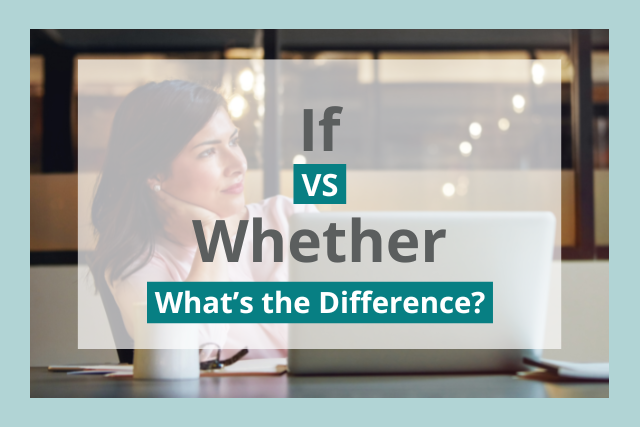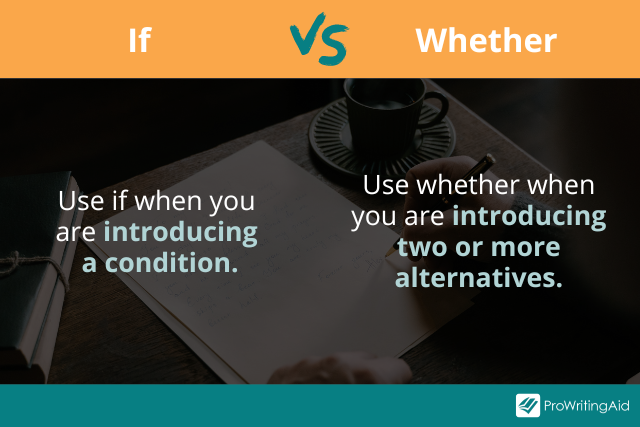
If and whether are subordinating conjunctions that are often used interchangeably. However, the two words are not synonymous.
So, when should you use if, and when should you use whether?
Use if when you are introducing a condition. Use whether when you are introducing two or more alternatives.
This article explains the differences between if and whether, and provides examples of each word in sentences.
What’s the Difference Between Whether vs If?
If and whether are both subordinating conjunctions used in a subordinate clause to create a conditional sentence. They are sometimes interchangeable, but not always.
Let’s take a closer look at the similarities and differences between whether and if.

When to Use Whether
The simple rule is that you should use whether when introducing a yes or no question. In all other instances, use if.
Whether Definition and Meaning
Whether is a conjunction used to express doubt or introduce two possibilities. For example:
- Whether or not you like your uniform, you have to wear it every day.
- You must always eat your vegetables whether you love them, tolerate them, or despise them.
The first example explains that it doesn’t matter if the child likes their uniform or if they don’t; they must wear it every day.
The second option introduces more than two options: the person may love vegetables, tolerate them, or despise them. But, regardless of their opinion, they must eat them.
Examples of Whether in Sentences
Let’s look at some more examples of using whether in a sentence.
- We don’t know whether to rent a house or buy one.
- The direction of this discussion depends on whether or not you did the required reading.
- I can’t determine whether I should buy the green dress or the blue one.
- We were wondering whether or not the Christmas formal is going to happen this year?
When to Use If
You should use if in every conditional sentence, unless you are introducing alternatives with a yes or no answer. In this case, use the word whether.
If Definition and Meaning
If is a conjunction used in conditional sentences. It means that a particular thing will only happen when another thing happens. For example:
- If it rains, then we will have to cancel the picnic.
- We are totally getting a Saturday detention if Miss Dinsdale finds out we broke the whiteboard.
In the first example, the picnic is dependent on the weather. In the second option, the children’s Saturday detention depends on their teacher’s knowledge of their actions.
You can also use if to introduce multiple conditions in the same sentence with. For example:
- If we have a good summer, and if the squirrels haven’t dug the bulbs up, the begonias will be beautiful.
In the sentence above, there are two conditions for the gardener to get good begonia flowers this year. Both the summer and the resident squirrels have to be good.
Examples of If in Sentences
Let’s take a look at some more examples of using if in sentences.
- If you want to get into Harvard, take note of what the Dean has to say.
- If in doubt, you can always ask me, and I will be happy to help.
- Generally, people are very understanding if you make a mistake.
- All the work we have put into this speech will be irrelevant if our train is late.
Tips for Knowing When to Use Whether vs If
Let’s quickly recap the differences between whether and if.
- Use if when your phrase introduces a condition.
- Use whether when you are asking an indirect question with two or more options.
If you can’t decide whether to use if or whether, ProWritingAid can help. The tool will highlight the incorrect word in the sentence, and suggest a correct answer that you can either reject or accept. You always have the final say on your own work.

